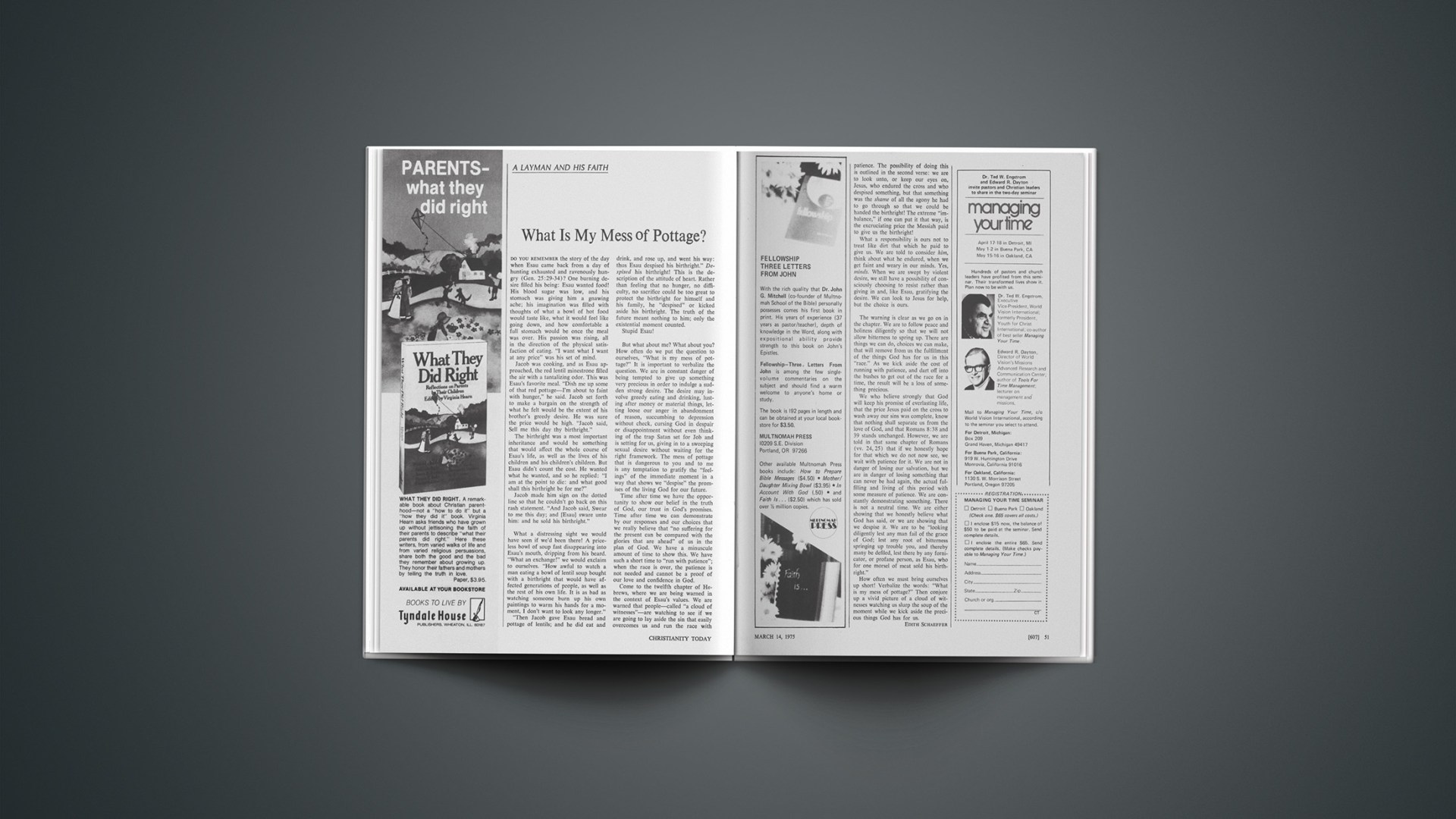Do you remember the story of the day when Esau came back from a day of hunting exhausted and ravenously hungry (Gen. 25:29–34)? One burning desire filled his being: Esau wanted food! His blood sugar was low, and his stomach was giving him a gnawing ache; his imagination was filled with thoughts of what a bowl of hot food would taste like, what it would feel like going down, and how comfortable a full stomach would be once the meal was over. His passion was rising, all in the direction of the physical satisfaction of eating. “I want what I want at any price” was his set of mind.
Jacob was cooking, and as Esau approached, the red lentil minestrone filled the air with a tantalizing odor. This was Esau’s favorite meal. “Dish me up some of that red pottage—I’m about to faint with hunger,” he said. Jacob set forth to make a bargain on the strength of what he felt would be the extent of his brother’s greedy desire. He was sure the price would be high. “Jacob said, Sell me this day thy birthright.”
The birthright was a most important inheritance and would be something that would affect the whole course of Esau’s life, as well as the lives of his children and his children’s children. But Esau didn’t count the cost. He wanted what he wanted, and so he replied: “I am at the point to die: and what good shall this birthright be for me?”
Jacob made him sign on the dotted line so that he couldn’t go back on this rash statement. “And Jacob said, Swear to me this day; and [Esau] sware unto him: and he sold his birthright.”
What a distressing sight we would have seen if we’d been there! A priceless bowl of soup fast disappearing into Esau’s mouth, dripping from his beard. “What an exchange!” we would exclaim to ourselves. “How awful to watch a man eating a bowl of lentil soup bought with a birthright that would have affected generations of people, as well as the rest of his own life. It is as bad as watching someone burn up his own paintings to warm his hands for a moment, I don’t want to look any longer.”
“Then Jacob gave Esau bread and pottage of lentils; and he did eat and drink, and rose up, and went his way: thus Esau despised his birthright.” Despised his birthright! This is the description of the attitude of heart. Rather than feeling that no hunger, no difficulty, no sacrifice could be too great to protect the birthright for himself and his family, he “despised” or kicked aside his birthright. The truth of the future meant nothing to him; only the existential moment counted.
Stupid Esau!
But what about me? What about you? How often do we put the question to ourselves, “What is my mess of pottage?” It is important to verbalize the question. We are in constant danger of being tempted to give up something very precious in order to indulge a sudden strong desire. The desire may involve greedy eating and drinking, lusting after money or material things, letting loose our anger in abandonment of reason, succumbing to depression without check, cursing God in despair or disappointment without even thinking of the trap Satan set for Job and is setting for us, giving in to a sweeping sexual desire without waiting for the right framework. The mess of pottage that is dangerous to you and to me is any temptation to gratify the “feelings” of the immediate moment in a way that shows we “despise” the promises of the living God for our future.
Time after time we have the opportunity to show our belief in the truth of God, our trust in God’s promises. Time after time we can demonstrate by our responses and our choices that we really believe that “no suffering for the present can be compared with the glories that are ahead” of us in the plan of God. We have a minuscule amount of time to show this. We have such a short time to “run with patience”; when the race is over, the patience is not needed and cannot be a proof of our love and confidence in God.
Come to the twelfth chapter of Hebrews, where we are being warned in the context of Esau’s values. We are warned that people—called “a cloud of witnesses”—are watching to see if we are going to lay aside the sin that easily overcomes us and run the race with patience. The possibility of doing this is outlined in the second verse: we are to look unto, or keep our eyes on, Jesus, who endured the cross and who despised something, but that something was the shame of all the agony he had to go through so that we could be handed the birthright! The extreme “imbalance,” if one can put it that way, is the excruciating price the Messiah paid to give us the birthright!
What a responsibility is ours not to treat like dirt that which he paid to give us. We are told to consider him, think about what he endured, when we get faint and weary in our minds. Yes, minds. When we are swept by violent desire, we still have a possibility of consciously choosing to resist rather than giving in and, like Esau, gratifying the desire. We can look to Jesus for help, but the choice is ours.
The warning is clear as we go on in the chapter. We are to follow peace and holiness diligently so that we will not allow bitterness to spring up. There are things we can do, choices we can make, that will remove from us the fulfillment of the things God has for us in this “race.” As we kick aside the cost of running with patience, and dart off into the bushes to get out of the race for a time, the result will be a loss of something precious.
We who believe strongly that God will keep his promise of everlasting life, that the price Jesus paid on the cross to wash away our sins was complete, know that nothing shall separate us from the love of God, and that Romans 8:38 and 39 stands unchanged. However, we are told in that same chapter of Romans (vv. 24, 25) that if we honestly hope for that which we do not now see, we wait with patience for it. We are not in danger of losing our salvation, but we are in danger of losing something that can never be had again, the actual fulfilling and living of this period with some measure of patience. We are constantly demonstrating something. There is not a neutral time. We are either showing that we honestly believe what God has said, or we are showing that we despise it. We are to be “looking diligently lest any man fail of the grace of God; lest any root of bitterness springing up trouble you, and thereby many be defiled, lest there by any fornicator, or profane person, as Esau, who for one morsel of meat sold his birthright.”
How often we must bring ourselves up short! Verbalize the words: “What is my mess of pottage?” Then conjure up a vivid picture of a cloud of witnesses watching us slurp the soup of the moment while we kick aside the precious things God has for us.










